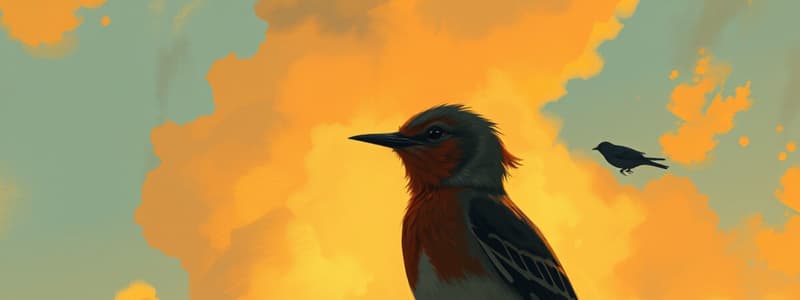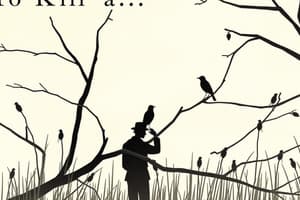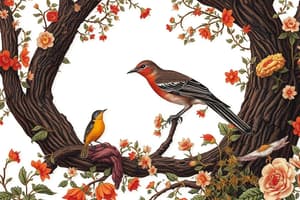Podcast
Questions and Answers
In Chapter 12, Calpurnia takes the Finch kids to her ______.
In Chapter 12, Calpurnia takes the Finch kids to her ______.
church
Who came to live with the Finch family in Chapter 13?
Who came to live with the Finch family in Chapter 13?
Aunt Alexandra
What question does Scout ask Atticus in Chapter 14?
What question does Scout ask Atticus in Chapter 14?
What's rape?
What event does Atticus go to the county jail for in Chapter 15?
What event does Atticus go to the county jail for in Chapter 15?
On trial day in Chapter 16, Jem, Scout, and Dill sneak into the courtroom and sit in the ______.
On trial day in Chapter 16, Jem, Scout, and Dill sneak into the courtroom and sit in the ______.
Who provides testimony in Chapter 17?
Who provides testimony in Chapter 17?
What significant detail does Tom show during his testimony in Chapter 18?
What significant detail does Tom show during his testimony in Chapter 18?
In Chapter 19, who supports Tom Robinson?
In Chapter 19, who supports Tom Robinson?
What was Atticus's closing remark in Chapter 20?
What was Atticus's closing remark in Chapter 20?
In Chapter 21, the verdict was Tom's guilty.
In Chapter 21, the verdict was Tom's guilty.
What does Jem do in response to the verdict in Chapter 22?
What does Jem do in response to the verdict in Chapter 22?
What does Scout learn about Bob Ewell's intentions in Chapter 23?
What does Scout learn about Bob Ewell's intentions in Chapter 23?
What tragic event occurs in Chapter 24?
What tragic event occurs in Chapter 24?
What does Scout find in Chapter 25?
What does Scout find in Chapter 25?
What event begins the school year in Chapter 26?
What event begins the school year in Chapter 26?
What does Bob Ewell attempt in Chapter 27?
What does Bob Ewell attempt in Chapter 27?
What happens to Jem and Scout on their way home in Chapter 28?
What happens to Jem and Scout on their way home in Chapter 28?
In Chapter 30, who is said to have killed Bob Ewell?
In Chapter 30, who is said to have killed Bob Ewell?
What does Scout realize about Boo Radley in Chapter 31?
What does Scout realize about Boo Radley in Chapter 31?
Study Notes
Chapter 12
- Calpurnia takes Scout and Jem to her church, illustrating cultural differences.
- Encounter with Lula, who challenges their presence at the church.
Chapter 13
- Aunt Alexandra moves in with the Finch family, aiming to impose her traditional values.
Chapter 14
- Scout questions Atticus about the meaning of rape, showcasing innocence and curiosity.
- Conflict arises among the children, leading to a physical fight.
- Dill runs away from home, revealing issues of neglect; Boo Radley is mentioned as having nowhere to escape.
Chapter 15
- Atticus goes to the jail to protect Tom Robinson before the trial, demonstrating his commitment to justice.
- A lynch mob confronts Atticus; Scout intervenes, diffusing the tension through innocence.
- Key figures include Mr. Cunningham and Mr. Underwood, who exhibit contrasting community dynamics.
Chapter 16
- The trial begins, with townspeople flocking to the courthouse; Jem, Scout, and Dill sneak into the colored balcony, highlighting racial segregation.
Chapter 17
- Heck Tate testifies, providing critical evidence in the trial against Tom Robinson.
- Bob Ewell, Mayella's father, offers his testimony, characterized by his aggressive demeanor.
Chapter 18
- Mayella Ewell's testimony reveals her difficult home life and suggestive accusations against Tom.
- Tom Robinson's left arm is identified as crippled, essential for understanding the case's narrative.
Chapter 19
- Tom Robinson testifies, expressing sympathy for Mayella and revealing his character.
- Link Deas supports Tom, providing a contrast to the prevailing prejudice in the community.
Chapter 20
- Dolphus Raymond comforts Dill, discussing societal norms and reputation.
- Atticus delivers a powerful closing argument, emphasizing themes of justice and morality.
Chapter 21
- Calpurnia reprimands the children for sneaking out, signifying parental concern.
- The verdict of guilty for Tom Robinson is announced, highlighting racial injustice in the legal system.
Chapter 22
- Jem's emotional reaction illustrates the impact of the trial's outcome on the younger generation.
- The African American community expresses gratitude to Atticus for his defense.
- Bob Ewell threatens Atticus, showcasing escalating tensions.
Chapter 23
- Atticus predicts a possible appeal outcome, reflecting his hope for justice.
- The conflict between Scout and Aunt Alexandra highlights generational differences.
- Boo Radley is mentioned as a character who prefers isolation.
Chapter 24
- The Missionary Circle meeting underscores the theme of hypocrisy within social circles.
- News of Tom's violent death is shared, revealing the brutal realities of racial injustice.
Chapter 25
- Scout encounters a roly-poly, representing childhood innocence; Jem advises against harming it.
- Mr. Underwood’s editorial criticizing Tom’s death emphasizes community sentiment.
Chapter 26
- Scout starts the third grade, reflecting the passage of time and character growth.
- Miss Gates' teachings reveal contradictions in American democracy and societal values.
Chapter 27
- Bob Ewell loses his job, symbolizing his declining status in society.
- Ewell's attempt to enter Judge Taylor's home signifies rising threats against the Finch family.
- Helen, Tom's widow, faces harassment from Ewell, showcasing continued racial hostility.
Chapter 28
- Scout participates in a school pageant, inadvertently becoming a target during her walk home with Jem.
- Bob Ewell attacks the children, but Boo Radley intervenes, saving them; Jem's injury marks a pivotal moment.
Chapter 29
- Scout recounts the events of the attack, showcasing her perspective and growth in understanding.
Chapter 30
- Heck Tate concludes that Boo killed Bob Ewell in self-defense; the decision emphasizes protecting Boo’s privacy.
- Scout draws a poignant parallel, likening Boo’s situation to the metaphor of "shooting a mockingbird."
Chapter 31
- Scout escorts Boo home, reflecting on key events from his perspective.
- The Gray Ghost symbolizes Boo Radley’s misunderstood life and contributions to the children’s safety.
Studying That Suits You
Use AI to generate personalized quizzes and flashcards to suit your learning preferences.
Description
Explore the significant events from Chapters 12 to 16 of 'To Kill a Mockingbird.' This quiz covers themes of cultural differences, family dynamics, innocence, and justice during critical moments in the storyline. Test your understanding of the characters and plot developments in these key chapters.




